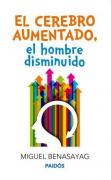El cerebro aumentado, el hombre disminuido

Starting from Plato, the Western tradition has always seen in the brain the seat of thought, with a role quite peculiar in the understanding of human phenomena, that could not be studied or, even less, modified. The advances of contemporary neurosciences have introduced an historical epochal break with this tradition: the fact that we can now study the brain and know how it works questions the very foundations of what is culturally considered the human subject.
If love, freedom, memory are more or less illusory effects of cerebral physiological processes, it is the same unity of man that seems to disperse itself, spreading out in a centrifugal movement. Furthermore, the hybridization between mind and computer, which already now is a reality, assures to the new man, with an increased brain, plants and neuroprosthesis with an incredible potential: seeing in the dark, hearing from distance, downloading skills, retrieving or modifying lost memories... all this in a period when the historicist and teleological promises of a coming perfect world have failed one after the other.
Far from any conservative or technophobic position, Miguel Benasayag tries to understand the anthropological implications of this revolution, especially in its most reductionist tendencies, looking for an humanistic alternative to the technocratic colonization of life and culture.